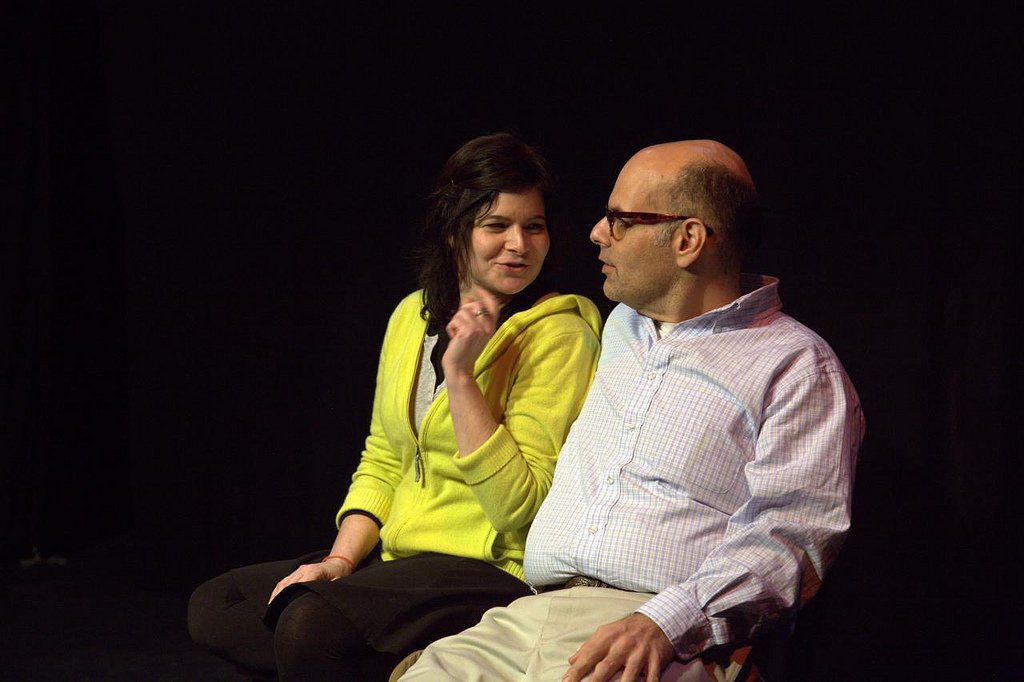3 Ways to Revive a Stalled Improv Scene

We have all been there. We’re in the middle of an improv scene and it is going nowhere. We are dying up there because the scene has stopped going forward. In most cases, an improv scene stalls out because we are being tentative with each other. We don’t need to give up, or even panic, we just need to introduce some new information. Here are three surefire ways to turn revived a stalled out improv scene.
- Reveal a secret
The fastest and easiest way to breathe new life into a dying scene is for one of the characters to reveal a secret to the other one. This will automatically change the tone of the scene and raise the stakes.I have found that the most effective secrets are ones that directly affect the two characters. For example, one coworker can reveal to another coworker that they have a crush on them. Or a couple in their 30s is going on their first date and one of them reveals they are still a virgin. The trick for this to work is the character’s reveal has to be believable, and the character receiving the secret needs to have a strong emotional reaction. If your character reveals that they lost their job two months ago and has been lying and pretending to go to work every morning, the other character has to have a strong response to this new information.Anger is the most obvious emotion to come up from someone revealing a secret, and don't be afraid to play it. It will always be more interesting than the scene you were doing that was going nowhere. Be open to other emotional responses as well and remember you will have to justify them. So, if you are excited that the other character told you about pretending to go work, you could respond happily, "I knew it! My therapist said I had to wait for you to bring it up."Now we have two quirky characters who are fun to watch.
- Have a Strong Emotional Response
Having a strong, heightened emotional response to something your partner just said is a great way to jumpstart a scene that is stuck. If your partner says, “I am going to Starbucks to get a Frappuccino,” you might respond sadly: “You’re breaking up me with me! You’re not really coming back.”Or you might respond frightened: “I have to go with you! It will look suspicious if it’s just you.”Or you might say flirty: “Just like when we were dating. I’ll meet you in the bed when you get back.”So, the process in your head might be to first realize what is going on, and then wait for the your partner’s next line to read into something it and have a heighten emotional response.
- Speak Your Want
This is a slight variation on revealing a secret, but instead, you are telling the other character what your character wants in the scene. Say you are doing a boss-and-employee scene, and it's going nowhere. The employee could say to the boss, "I want to be fired." (Again, be believable.)Boss: You are kidding...Employee: No, I took this job to please my parents. I really want to be a writer, but I promised them I wouldn't quit.Boss: I have never fired anyone before.
Now we have two very interesting characters.
An extra bonus: A Want Exercise
I have an exercise that helps students find their wants in scenes. Improvisers are usually told not to do transaction scenes. They usually fall flat because there is no shared history between the charatacters. What typically happens is the scene becomes about returning a sweater, and because the characters have no shared history or relationship with each other, it is boring to watch. That being said, I think you will have different results with this exercise because you will provide the players with a both a relationship and a want.
Set Up: Two Players at a Starbucks. One player is the customer. One player is the barista.
Activity: They need to play it believable. The barista is responsible for the environment, such as using the cash register, making the coffee, etc. The customer needs to know what he is ordering, just like he really came into a Starbucks.
Ground Rules: In the scene, the customer is either coming into the store to break up with or ask out the barista. If the customer is coming to ask the barista out, the customer is a regular and has been coming in for a long period of time and they have shared history.
Try this scene and see if you can imbue your character with a want to make the scene come to life.
Sign up now for Jimmy's next Virtual Drop-In Class on July 22, 2024. Only $45!

